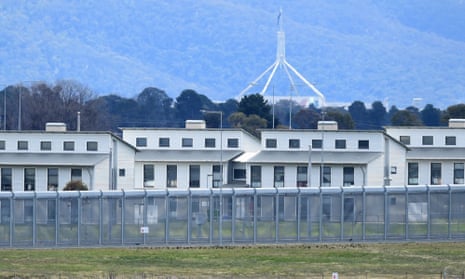The strip search of a female inmate inside a Canberra prison earlier this year breached the territory’s Human Rights Act, according to a damning review which also found the ACT’s policies around mandatory searches did not have a legal basis.
The ACT’s Inspector of Correctional Services (ICS) on Thursday released the review into the strip search of a 37-year-old Indigenous prisoner at the Alexander Maconochie jail earlier this year.
The search made headlines after the Guardian revealed the incident in January. The ACT government obtained court orders suppressing footage depicting prison guards forcibly strip-searching the woman.
The Guardian previously reported that the woman was a sexual assault survivor with a number of physical and mental health issues including a heart condition requiring a pacemaker.
On the day of the search, she had been denied approval to attend her grandmother’s funeral “due to logistics” and, according to the ICS report, began threatening to self-harm.
According to the inspector’s report, she was moved to the prison’s crisis support unit where she refused to undergo a strip search. Footage reviewed in the investigation showed the woman yelling “cannot breathe” at various times while detained.
“During the use of force there are up to 12 staff in the immediate vicinity, some at times enter the cell, and others stay by the door or in the corridor outside the cell,” the report states.
“At least two of these staff are male. The use of force could also potentially be viewed live on CCTV by staff at the CSU duty point, in the operations building and in the master control room”.
The report states that while the corrective officers were holding her down, the woman eventually agreed to comply with a search that occurred in front of two female officers in a bathroom. For that reason, the ICS report found the search did not occur in front of male officers.
The prisoner in a letter had alleged she was also stripped naked by the guards in view of other male inmates.
The report was damning on the use of force during the search and policies which required mandatory strip searches of inmates entering the crisis support unit.
It found that the decision to use force to carry out the search initially was “not a last resort as required” by the territory’s Corrections Management Act and that it did not comply with the territory’s Human Rights Act.
“There is no doubt that the use of force would have been a highly traumatic incident for [the woman], particularly given her recent history of sexual assault, her ongoing mental health condition, and the feelings of loss and grief experienced from the sudden death of her grandmother,” Thursday’s report stated.
“Furthermore, [the woman] had medical conditions relating to her heart and lung which were known to the [prison officers], and it is highly likely that any risks to [her] health posed by using force and restraining her were significantly increased due to these conditions.
“We note that the decision to conduct a forced strip search was not an approach that all staff were entirely comfortable with. This incident has been stressful for some staff involved.”
The ICS, Neil McAllister, found the decision to carry out the search was lawful because staff had a “reasonable suspicion” the woman was “concealing a ‘seizable item’ that could be used to harm herself or others”. But he found the decision to conduct a forced strip search “did not comply” with the territory’s own Human Rights Act.
The report stated that while corrections staff were not explicitly required to consider an inmate’s human rights when conducting a forced strip search it was “inexcusable” that it was not “directed by policy and procedure”.
“The decision to conduct a forced strip search and the events that followed … was an unreasonable limitation on [the woman’s] human rights,” the report found.
“This conclusion is reached because of [the woman’s] additional vulnerabilities including her mental and physical health condition [which] caused what is an already inherently degrading practice to have even more of an impact on her rights, and because there was a less restrictive means that was not explored.”
In response to the report, the ACT’s corrections minister, Mick Gentleman, said the government would fast-track the purchase of body scanners to limit the need for strip searches.
“ACT Corrective Services was already in the process of procuring a full body scanner for the [prison]. In light of the inspector’s recommendation, we’ll now procure two,” he said.
“I understand strip searches can be stressful and traumatising for both detainees and staff and as a result we would like to minimise strip-searching as much as possible.”
